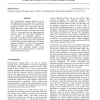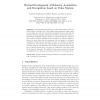246 search results - page 10 / 50 » Learning behavior styles with inverse reinforcement learning |
ICML
2000
IEEE
14 years 3 days ago
2000
IEEE
The reinforcement learning problem can be decomposed into two parallel types of inference: (i) estimating the parameters of a model for the underlying process; (ii) determining be...
ICRA
1994
IEEE
13 years 12 months ago
1994
IEEE
Within the field of robotics, much recent attention has been given to control techniques that have been termed reactive or behavior-based. The design of such control systems for e...
ATAL
2010
Springer
13 years 8 months ago
2010
Springer
As learning agents move from research labs to the real world, it is increasingly important that human users, including those without programming skills, be able to teach agents de...
IROS
2008
IEEE
14 years 2 months ago
2008
IEEE
Abstract. Both self-learning architecture (embedded structure) and explicit/implicit teaching from other agents (environmental design issue) are necessary not only for one behavior...
FLAIRS
1998
13 years 9 months ago
1998
Our focus is on designing adaptable agents for highly dynamic environments. Wehave implementeda reinforcement learning architecture as the reactive componentof a twolayer control ...


